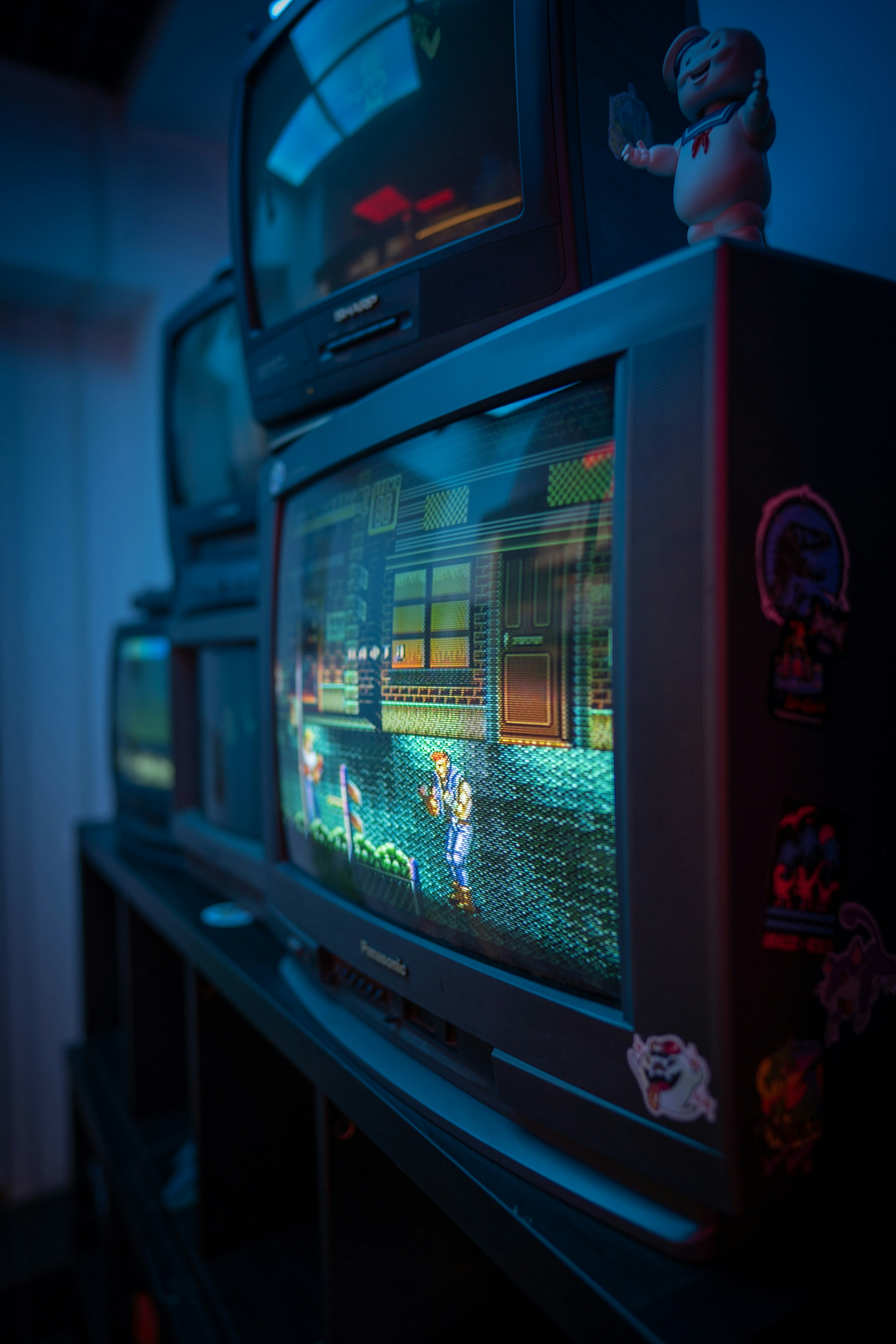Support our educational content for free when you purchase through links on our site. Learn more
What Is Similar to Video Games? 7 Surprising Alternatives in 2025 🎮

Ever wondered what activities capture the thrill, challenge, and social buzz of video games—without staring at a screen? Whether you’re a dedicated gamer looking to unplug or just curious about game-like experiences beyond consoles, you’re in the right place. In this deep dive, we reveal 7 surprising alternatives to video games that deliver the same rush of progression, storytelling, and community. From immersive escape rooms to gamified fitness apps, and even live-action role-playing, the world of play is far bigger than pixels.
Here’s a teaser: Did you know that some people find video games boring because they crave deeper social connection or real-world immersion? Later, we’ll explore how activities like LARP and interactive theater fill that gap—and how gamification is revolutionizing everything from education to workplace productivity. Ready to level up your leisure time? Let’s go!
Key Takeaways
- Game-like experiences extend well beyond digital screens, including board games, escape rooms, and gamified apps.
- Core elements like clear goals, progression, feedback, narrative, and social interaction make any activity feel “game-like.”
- Gamification is transforming fitness, education, and work by turning tasks into engaging quests.
- Real-world immersive experiences like LARP and interactive storytelling offer rich social and emotional engagement that some video games lack.
- Balancing digital and analog play leads to healthier, more fulfilling leisure time.
Ready to explore these game-like worlds? Check out our curated recommendations:
- Escape Rooms & Board Games: Shop Escape Room Games on Amazon | Settlers of Catan on Amazon
- Gamified Fitness Apps: Zombies, Run! on Apple App Store | Fitbit Official Site
- LARP Communities: Dagorhir Official Website | NERO International
Dive in and discover your next favorite way to play—beyond the screen!
Table of Contents
- ⚡️ Quick Tips and Facts: Your Fast Track to Game-Like Fun
- 🎮 The Evolution of Play: From Board Games to Digital Worlds
- 🤔 What Makes Something “Game-Like”? Decoding the Core Elements
- The “Games Like™” Top Picks: Our Favorite Non-Video Game Adventures
- 🧠 The Psychology of Play: Why We Crave Game-Like Experiences
- 🌍 Real-World Impact: Where Game Mechanics Shine Brightest
- 🤔 How to Find Your Next Game-Like Obsession: A Gamer’s Guide to Unplugged Fun
- ⚖️ Balancing the Digital & Analog: A Healthy Approach to Play & Life
- ✅ Our Expert Recommendations: Beyond the Screen, Beyond Expectation
- Conclusion: The Game of Life, Unplugged and Unleashed
- 🔗 Recommended Links: Dive Deeper into the World of Play
- ❓ FAQ: Your Burning Questions About Game-Like Experiences Answered
- 📚 Reference Links: Our Sources & Further Reading for the Curious Mind
⚡️ Quick Tips and Facts: Your Fast Track to Game-Like Fun
Welcome to the ultimate guide on what is similar to video games! Whether you’re a hardcore gamer or just curious about the magic behind game-like experiences, we’ve got you covered. Here are some quick nuggets from our team at Games Like™ to get you started:
- ✅ Game-like experiences aren’t limited to screens. Think escape rooms, LARPing, and even gamified fitness apps.
- ✅ Core elements of games include challenge, progression, feedback, and narrative. These can be found in many non-video game activities.
- ✅ Gamification is everywhere—from education to workplace productivity. It’s about making tasks feel like quests.
- ✅ Social connection and immersion are key drivers of engagement. Games that foster community keep players hooked.
- ✅ Not all games appeal to everyone. Some people prefer story-rich, emotional experiences over action-heavy gameplay.
Fun fact: The average gamer spends over 6 hours a week playing games, but many also enjoy board games, puzzles, and interactive storytelling offline. Curious how these worlds overlap? Stick with us! 🎲🎮
🎮 The Evolution of Play: From Board Games to Digital Worlds
Before pixels and polygons, humans gathered around tables and campfires to share stories and compete. The journey from traditional play to video games is a fascinating tale of innovation and cultural shifts.
The Origins of Play
- Board games like Chess and Go have been around for thousands of years, emphasizing strategy and skill.
- Card games and puzzles introduced randomness and problem-solving.
- The 20th century saw the rise of tabletop role-playing games (RPGs) like Dungeons & Dragons, blending narrative and player choice.
The Digital Revolution
- The 1970s brought arcade classics like Pong and Space Invaders.
- Home consoles like the Nintendo Entertainment System (NES) and Sega Genesis expanded gaming’s reach.
- Today’s games are immersive, social, and often blend genres—thanks to advances in graphics, AI, and online connectivity.
Why does this matter? Understanding play’s roots helps us appreciate what makes game-like experiences tick—whether on a screen or in real life.
🤔 What Makes Something “Game-Like”? Decoding the Core Elements
So, what exactly makes an experience feel like a video game without being one? Our Games Like™ experts break down the five pillars of game-likeness:
1. Clear Goals and Challenges
Games give you a target—beat the boss, solve the puzzle, or complete the quest. Without goals, engagement plummets.
2. Progression and Feedback
Leveling up, unlocking new content, or earning badges provide a sense of growth. Immediate feedback keeps you motivated.
3. Rules and Structure
Boundaries create meaningful choices. Whether it’s turn-based moves in a board game or time limits in a fitness app, rules shape the experience.
4. Narrative and Meaning
A compelling story or context hooks players emotionally. Even simple games like Angry Birds have a narrative arc.
5. Social Interaction
Multiplayer modes, leaderboards, or cooperative quests foster community and friendly competition.
Pro tip: When looking for game-like activities, check if they tick most of these boxes. If yes, you’re in for a treat!
The “Games Like™” Top Picks: Our Favorite Non-Video Game Adventures
Ready to explore? We’ve curated our top categories of game-like experiences beyond video games, with detailed insights and real-world examples.
1. 🚀 Gamification Unpacked: Turning Life into a Game
Gamification is the art of applying game mechanics to non-game contexts. It’s everywhere—from apps to workplaces.
Workplace Wonders: Gamified Productivity & Engagement
- Platforms like Asana and Trello use badges, progress bars, and rewards to boost productivity.
- Companies like Salesforce integrate leaderboards to motivate sales teams.
- Benefits include increased motivation, clearer goals, and better teamwork.
Education Reimagined: Learning Through Play & Progression
- Apps like Kahoot! and Duolingo turn studying into interactive quests.
- Embedded just-in-time instruction and low cost of failure mimic video game learning loops (source: mrmeyer.com).
- Students report higher engagement and retention.
Fitness Fun: Leveling Up Your Health & Wellness
- Apps like Zombies, Run! and Fitbit Challenges turn workouts into immersive missions.
- Social features and rewards encourage consistency.
- Gamification helps overcome exercise boredom.
Everyday Quests: Making Chores & Habits Exciting
- Tools like Habitica transform daily tasks into RPG-style quests.
- Users earn points and unlock rewards for mundane activities.
- This approach boosts habit formation and satisfaction.
2. 🎭 Interactive Entertainment Beyond the Screen
Not all fun happens behind a screen. Here’s where real-world interaction shines.
Escape Rooms & Immersive Experiences: Puzzles in Real Life
- Physical rooms with puzzles and storylines.
- Popular chains include Escape Hunt and The Escape Game.
- Players collaborate under time pressure, blending problem-solving and narrative.
Live-Action Role-Playing (LARP): Your Story, Your Rules, Your World
- Participants physically act out characters in elaborate settings.
- Combines storytelling, improvisation, and social interaction.
- Communities like Dagorhir and NERO International have thousands of members worldwide.
Interactive Storytelling: Choose Your Own Adventure, IRL
- Events where participants make choices that affect outcomes.
- Examples include murder mystery dinners and immersive theater like Sleep No More.
- Offers emotional engagement similar to narrative-driven games.
3. 🏆 The Thrill of Competition: Skill-Based Pursuits & Analog Arenas
Competition is a timeless motivator. Here’s how it manifests outside video games.
Board Games & Card Games: Strategy, Luck, and Social Showdowns
- Classics like Settlers of Catan, Magic: The Gathering, and Chess.
- Emphasize tactics, bluffing, and social dynamics.
- Growing popularity with cafes and tournaments worldwide.
Puzzles & Brain Teasers: Mental Marathons for Masterminds
- Crosswords, Sudoku, and logic puzzles challenge cognitive skills.
- Apps like Lumosity gamify brain training.
- Great for solo play and mental fitness.
Esports & Traditional Sports: The Ultimate Showdown of Skill
- Esports tournaments like League of Legends Worlds draw millions of viewers.
- Traditional sports offer physical challenge and community.
- Both provide structured competition and spectator excitement.
4. 🌌 Stepping into New Realities: VR/AR Beyond Gaming & Entertainment
Virtual and augmented reality are expanding the definition of game-like experiences.
Training Simulations: Mastering Skills in Virtual Worlds
- VR simulators for pilots, surgeons, and military personnel.
- Provide risk-free environments with instant feedback.
- Companies like STRIVR lead in immersive training tech.
Virtual Tourism & Exploration: Wander Without Leaving Home
- Apps like Google Earth VR and Wander let users explore global landmarks.
- Combine exploration with interactive elements.
- Great for education and accessibility.
Augmented Reality Apps: Blending Digital with Reality, Seamlessly
- Apps like Pokémon GO and IKEA Place overlay digital content on the real world.
- Encourage movement and discovery.
- Popular for social play and practical use.
5. 🎨 Crafting Worlds: Creative Pursuits with Game-Like Elements
Creativity and play go hand in hand. Here’s how game mechanics inspire artistic endeavors.
Digital Art & Design Tools: Your Canvas, Your Rules, Your Creation
- Software like Procreate, Adobe Photoshop, and Blender offer layered workflows and unlockable features.
- Artists “level up” skills and share creations in communities.
- Gamified tutorials enhance learning.
Music Production Software: Composing Your Own Soundtrack to Life
- Tools like Ableton Live and FL Studio provide step sequencers and effects chains.
- Users experiment, iterate, and share tracks.
- Platforms like SoundCloud foster social feedback.
Coding & Programming: Building Your Own Digital Universe, Line by Line
- Platforms like Scratch and Codecademy gamify learning to code.
- Users earn badges and build projects.
- Programming is a creative, problem-solving game itself.
🧠 The Psychology of Play: Why We Crave Game-Like Experiences
Why do we love games so much? The answer lies deep in our brains.
The Allure of the “Flow State”: Getting Lost in the Moment
- Coined by psychologist Mihaly Csikszentmihalyi, flow is a state of deep focus and enjoyment.
- Games balance challenge and skill to induce flow.
- Activities with game-like elements can trigger this immersive state.
Dopamine & Reward Systems: The Brain’s High Score Mechanism
- Dopamine release reinforces behaviors linked to rewards.
- Games provide frequent, meaningful rewards—points, achievements, story progression.
- This neurochemical feedback loop keeps us coming back.
Social Connection & Community Building: Playing Together, Staying Together
- Humans are social creatures; shared play fosters bonds.
- Multiplayer games and cooperative activities create communities.
- Social support enhances motivation and enjoyment.
🌍 Real-World Impact: Where Game Mechanics Shine Brightest
Game-like elements aren’t just fun—they can change lives.
Edutainment: Making Learning Irresistible & Effective
- Combining education and entertainment boosts engagement.
- Examples: BrainPOP, Minecraft: Education Edition.
- Embedded feedback and storytelling improve retention.
Health & Wellness: Gamified Fitness & Mental Health Boosters
- Apps like Headspace use streaks and progress bars to encourage mindfulness.
- Fitness trackers reward movement and consistency.
- Gamification can reduce anxiety and improve habits.
Business & Productivity: Leveling Up Your Work Life & Team Cohesion
- Platforms like Salesforce and Microsoft Teams incorporate badges and leaderboards.
- Gamified workflows increase motivation and collaboration.
- Companies report higher employee satisfaction and output.
🤔 How to Find Your Next Game-Like Obsession: A Gamer’s Guide to Unplugged Fun
If you’re craving the thrill of video games but want to unplug, here’s how to discover your perfect game-like activity:
- Identify what you love about games: Is it story, competition, socializing, or creativity?
- Explore related activities: If you love RPGs, try LARP or interactive storytelling. For puzzle fans, board games or escape rooms shine.
- Join communities: Meetup.com and Facebook groups are gold mines for local events.
- Try gamified apps: Habitica for habits, Zombies, Run! for fitness, or Duolingo for learning.
- Mix and match: Combine creative pursuits with social play for maximum fun.
Personal story: One of our developers swapped hours of The Witcher 3 for weekend LARP sessions and found the real-world immersion and friendships deeply rewarding. You might too!
⚖️ Balancing the Digital & Analog: A Healthy Approach to Play & Life
While video games offer incredible experiences, balance is key. Here’s our take on maintaining harmony:
- Set boundaries: Allocate specific times for gaming and offline play.
- Diversify your play: Mix digital games with board games, outdoor sports, or creative hobbies.
- Mind your mental health: If gaming feels stressful or isolating, explore social or physical game-like activities.
- Embrace the flow: Seek activities that engage you fully, whether on screen or off.
- Stay curious: The world is full of game-like adventures waiting to be discovered.
Remember, the best game is the one that makes you feel alive, connected, and fulfilled.
✅ Our Expert Recommendations: Beyond the Screen, Beyond Expectation
Here’s a curated list of standout game-like experiences we recommend trying:
| Experience Type | Recommended Examples | Why We Love It |
|---|---|---|
| Escape Rooms | Escape Hunt, The Escape Game | Real-time puzzles, teamwork, and immersive stories |
| Gamified Fitness Apps | Zombies, Run!, Fitbit Challenges | Turns exercise into thrilling quests |
| Board Games | Settlers of Catan, Ticket to Ride | Strategy, social interaction, and replayability |
| LARP | Dagorhir, NERO International | Deep role-play and community bonding |
| Interactive Storytelling | Sleep No More, Murder Mystery Dinners | Emotional engagement and choice-driven narratives |
| Educational Apps | Duolingo, Kahoot! | Learning made fun and addictive |
| VR Training Simulations | STRIVR, Oculus Training Apps | Safe skill-building with immersive feedback |
Pro tip: For more ideas on games like your favorites, check out our Games Like™ database.
Ready to dive deeper? Our next sections explore the fascinating psychology behind game-like experiences and their real-world impact. Stay tuned!
Conclusion: The Game of Life, Unplugged and Unleashed

So, what is similar to video games? As we’ve explored, the answer is a rich tapestry of experiences that capture the essence of play, challenge, narrative, and social connection—both on and off the screen. From the immersive puzzles of escape rooms to the strategic depth of board games, from gamified fitness apps to the creative worlds built through coding and digital art, game-like experiences are everywhere, waiting to be discovered.
Our journey revealed that game-like elements—clear goals, progression, feedback, narrative, and social interaction—are the secret sauce that makes any activity addictive and rewarding. Whether you’re a gamer seeking new adventures or someone curious about the magic behind games, there’s a whole universe beyond traditional video games that can fulfill your craving for engagement and fun.
We also addressed the question of why some people find video games boring or unrelatable. The key takeaway? Games that care about their audience, offer emotional depth, and reflect diverse experiences resonate best. This insight opens the door to exploring interactive storytelling, LARP, and other forms of play that prioritize connection and meaning.
If you’ve ever wondered how to find your next game-like obsession or how to balance digital and analog play, we hope our expert tips and recommendations light the way. The world is full of quests, challenges, and stories beyond the screen—go out and play!
🔗 Recommended Links: Dive Deeper into the World of Play
Ready to level up your game-like experiences? Check out these top picks and resources:
-
Escape Rooms:
-
Gamified Fitness Apps:
-
Board Games:
-
LARP Communities:
-
Interactive Storytelling:
-
Educational Apps:
-
VR Training Simulations:
-
Books on Game Design and Psychology of Play:
- “Reality Is Broken” by Jane McGonigal: Amazon Link
- “The Art of Game Design” by Jesse Schell: Amazon Link
- “Flow: The Psychology of Optimal Experience” by Mihaly Csikszentmihalyi: Amazon Link
❓ FAQ: Your Burning Questions About Game-Like Experiences Answered

What are some hobbies similar to playing video games?
If you love video games, you might enjoy hobbies that share their core elements: challenge, progression, and social interaction. Examples include:
- Board and card games like Settlers of Catan or Magic: The Gathering offer strategic depth and social play.
- Escape rooms provide immersive puzzles and teamwork.
- Live-action role-playing (LARP) lets you embody characters in interactive stories.
- Gamified fitness apps like Zombies, Run! turn exercise into quests.
- Creative pursuits such as digital art or music production involve progression and feedback loops similar to games.
These hobbies engage your mind and social instincts, much like video games do.
Are there any other forms of entertainment that offer similar experiences to video games?
Absolutely! Interactive storytelling events, immersive theater (e.g., Sleep No More), and augmented reality (AR) apps blend narrative, choice, and engagement. Podcasts with branching storylines and choose-your-own-adventure books also offer game-like agency. These forms provide emotional connection and decision-making, key to game enjoyment.
What can I do if I enjoy the storytelling in video games but want to try something new?
If narrative hooks you, consider:
- Interactive theater or murder mystery dinners, where your choices influence outcomes.
- Tabletop RPGs like Dungeons & Dragons, which emphasize collaborative storytelling.
- Reading choose-your-own-adventure books or exploring narrative podcasts.
- Creative writing or world-building communities online.
These options let you immerse yourself in stories while actively shaping them.
How can I find books or movies that are similar to my favorite video games?
Look for media that share themes, genres, or narrative styles with your games. For example:
- Fans of The Witcher games might enjoy Andrzej Sapkowski’s original book series.
- Lovers of sci-fi RPGs like Mass Effect could explore films like Blade Runner or books by Isaac Asimov.
- Use platforms like Goodreads or IMDb to search by genre or keywords.
- Communities on Reddit or specialized forums often have curated lists linking games to related media.
Read more about “What Is the Top #1 Game? 🎮 The Ultimate 2025 Showdown”
Are there any tabletop games or board games that resemble video games?
Yes! Many modern board games incorporate video game mechanics:
- Deck-building games like Dominion mimic progression and strategy.
- Legacy games such as Pandemic Legacy evolve over time, similar to RPG campaigns.
- Cooperative games like Gloomhaven offer tactical combat and story arcs.
- Eurogames focus on resource management and strategy, akin to simulation games.
Check out Games Like™ Cooperative category for recommendations.
Read more about “🎮 10 Must-Play Games for Fans of Your Favorites (2025)”
What are some alternative ways to engage in virtual worlds or simulations besides video games?
Virtual reality (VR) and augmented reality (AR) offer immersive experiences beyond traditional gaming:
- VR training simulators help professionals practice skills safely.
- Virtual tourism apps let you explore faraway places interactively.
- Social VR platforms like VRChat enable avatar-based interaction.
- Coding and programming platforms allow you to build your own virtual environments.
These alternatives blend creativity, exploration, and socializing.
Can I find online communities or forums that discuss topics similar to those found in video games?
Definitely! Online forums and communities abound:
- Reddit has subreddits like r/gaming, r/boardgames, and r/larp.
- Discord servers host groups focused on specific games or game-like hobbies.
- Specialized forums such as BoardGameGeek or RPG.net offer deep discussions.
- Social media groups on Facebook or Twitter connect enthusiasts worldwide.
Engaging with these communities can enrich your experience and introduce you to new game-like activities.
📚 Reference Links: Our Sources & Further Reading for the Curious Mind
- Video Games Making Math More Like Things Students Like – Dan Meyer
- Video Games Are Boring – GamesIndustry.biz
- Don’t practice piano like it’s a video game – Keyboard Improv
- Escape Hunt Official Website
- The Escape Game Official Website
- Dagorhir Official Website
- NERO International LARP
- STRIVR VR Training
- Duolingo Language Learning
- Kahoot! Learning Platform
- Goodreads
- BoardGameGeek
We hope this comprehensive guide has sparked your curiosity and inspired you to explore the vast, exciting world of game-like experiences beyond video games. Whether you’re chasing the thrill of competition, the joy of storytelling, or the satisfaction of creative mastery, there’s a game-like adventure waiting just around the corner. Happy playing! 🎲🎉




